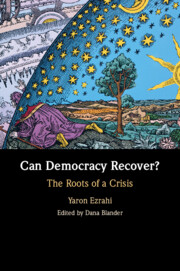Book contents
- Can Democracy Recover?
- Can Democracy Recover?
- Copyright page
- Dedication
- Contents
- Preface
- Words from the Author
- Introduction
- Part I The Rise of Western Politics following the Collapse of the Monistic Medieval Cosmology
- Part II The Emergence of the Epistemological Constitution of Modern Democracy
- Part III The Dialectics of Objectification
- Part IV The Erosion of the Epistemological Constitution of Modern Democracy
- 12 The Political Disempowerment of the Modern Democratic Citizen
- 13 The Elusiveness of Political Causality
- 14 The Loss of Self-Evident Public Facts and the Crisis of the Commonsense Conceptions of Reality
- 15 The Decay of the Epistemological Norm of Political Visibility
- 16 The Fall of Objectivity and Objectification
- Part V Democracy beyond Modernity
- Can Democracy Recover? Concluding Reflections
- Epilogue
- Index
13 - The Elusiveness of Political Causality
from Part IV - The Erosion of the Epistemological Constitution of Modern Democracy
Published online by Cambridge University Press: 02 January 2025
- Can Democracy Recover?
- Can Democracy Recover?
- Copyright page
- Dedication
- Contents
- Preface
- Words from the Author
- Introduction
- Part I The Rise of Western Politics following the Collapse of the Monistic Medieval Cosmology
- Part II The Emergence of the Epistemological Constitution of Modern Democracy
- Part III The Dialectics of Objectification
- Part IV The Erosion of the Epistemological Constitution of Modern Democracy
- 12 The Political Disempowerment of the Modern Democratic Citizen
- 13 The Elusiveness of Political Causality
- 14 The Loss of Self-Evident Public Facts and the Crisis of the Commonsense Conceptions of Reality
- 15 The Decay of the Epistemological Norm of Political Visibility
- 16 The Fall of Objectivity and Objectification
- Part V Democracy beyond Modernity
- Can Democracy Recover? Concluding Reflections
- Epilogue
- Index
Summary
The chapter examines the role of causality in politics, demonstrating how democratic politics shifted from a top-down causality, from divinity to monarchy, to a bottom-up causality, from the public to its representatives. This shift is evident in the establishment of periodic elections and democratic institutions, which are designed to legitimize causality derived from human agency. Concurrently, horizontal causality emerged through entities like political parties, civil society, and social media. However, this democratic causality has been weakening over recent decades due to several factors: the diminished capacity of political institutions to represent political causality, the illusion of a direct link between politicians and the public, particularly through mass media and social networks, and the erosion of the concept of “the public” as a democratic entity. In recent years, the public has experienced political fragmentation and lacks unifying forces like ideologies, parties, and labor unions. Another contributing factor to the weakening of causality is the declining faith in science and expertise, which are now associated with elitism. This has led to a weakening of quasi-scientific causality in politics and a rise of the “charisma of ignorance.”
Keywords
- Type
- Chapter
- Information
- Can Democracy Recover?The Roots of a Crisis, pp. 134 - 138Publisher: Cambridge University PressPrint publication year: 2025

